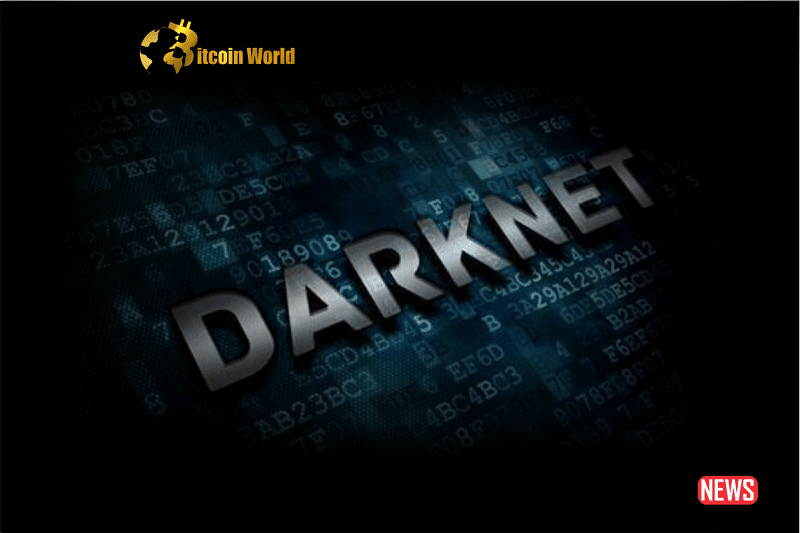Imagine your hard-earned cryptocurrency falling into the wrong hands. It’s a chilling thought, right? Well, the reality is that cybercriminals are actively trading compromised crypto accounts on the darknet, and the prices might surprise (and alarm) you. Let’s dive into this murky world and understand the risks involved.
What’s the Price of Your Privacy? The Darknet Crypto Bazaar
A recent study by Privacy Affairs has shed light on the going rates for illicitly obtained financial information lurking in the dark corners of the internet. Their report, aptly named “The Dark Web Price Index,” reveals a disturbing trend: verified cryptocurrency exchange accounts are being sold for as little as $30. Think about that for a moment – the keys to your digital kingdom could be changing hands for the price of a takeaway meal.
Here’s a snapshot of how much your verified crypto account might be worth to a cybercriminal:
- Kraken verified account: $1,170
- Binance verified account: $410
- Crypto.com verified account: $300
- Coinbase verified account: $250
- U.S.-verified Bittrex account: $30
Interestingly, the prices for some of these accounts have actually increased since last year. In 2022, a confirmed Kraken account would have cost a hacker around $260, while a Binance account fetched about $250. This price surge indicates a growing demand and potentially a more sophisticated market for these stolen credentials.
Beyond Crypto: A Shopping List for Cybercriminals
It’s not just crypto accounts on the menu. The darknet acts as a one-stop shop for various compromised financial details. Consider this:
- Credit card details (up to $5,000 credit): Around $110
- Online bank account logins (up to $2,000 balance): Roughly $60
- Hacked social media accounts (Facebook, Airbnb, Gmail): Starting at $25
How Do They Get Your Information? Bypassing KYC and More
You might be wondering how cybercriminals manage to get their hands on these verified accounts. The answer often lies in exploiting vulnerabilities in security measures, including the very Know Your Customer (KYC) procedures designed to protect us. Through phishing scams, malware, and other illicit methods, they obtain personal information that allows them to either directly access accounts or create fraudulent ones.
What Are the Risks? More Than Just Losing Money
The consequences of your account details ending up on the darknet extend far beyond just financial loss. Imagine the potential damage:
- Financial devastation: Losing your cryptocurrency or having your bank accounts drained can have a significant impact.
- Identity theft: Your personal information can be used for various fraudulent activities, impacting your credit score and reputation.
- Reputational damage: Compromised social media accounts can be used to spread misinformation or engage in harmful activities, reflecting poorly on you.
A Victim’s Story: The Harsh Reality of Account Hacking
The threat of account hacking is very real, and the consequences can be devastating. Take the case of the Coinbase user who recently filed a lawsuit against the exchange after losing a staggering 90% of his life savings. This individual fell victim to a “SIM swap” attack, a technique where criminals trick telecom providers into transferring a victim’s phone number to a SIM card they control. This allowed them to bypass two-factor authentication and gain access to his account. This serves as a stark reminder of the vulnerabilities that exist and the lengths cybercriminals will go to.
Staying Safe in a Risky Digital World: Actionable Insights
So, what can you do to protect yourself from becoming a victim? Here are some crucial steps:
- Strengthen your passwords: Use strong, unique passwords for all your online accounts, especially financial ones. Consider using a password manager.
- Enable two-factor authentication (2FA): This adds an extra layer of security, making it much harder for unauthorized users to access your accounts. Use authenticator apps instead of SMS-based 2FA where possible.
- Be wary of phishing attempts: Never click on suspicious links or provide personal information in response to unsolicited emails or messages.
- Keep your software updated: Regularly update your operating system, web browser, and antivirus software to patch security vulnerabilities.
- Monitor your accounts regularly: Keep a close eye on your bank and cryptocurrency accounts for any suspicious activity.
- Be cautious on social media: Limit the amount of personal information you share publicly.
The Bottom Line: Vigilance is Key
As Miklos Zoltan, a security expert at Privacy Affairs, aptly points out, the prices listed on the darknet represent what your personal information is worth to cybercriminals – a mere opportunity for quick profit. However, for you, the value of your financial security and online privacy is immeasurable. In this increasingly digital world, staying vigilant and proactive about your online security is more critical than ever. Don’t let your digital life become a bargain on the dark web.
Disclaimer: The information provided is not trading advice, Bitcoinworld.co.in holds no liability for any investments made based on the information provided on this page. We strongly recommend independent research and/or consultation with a qualified professional before making any investment decisions.


